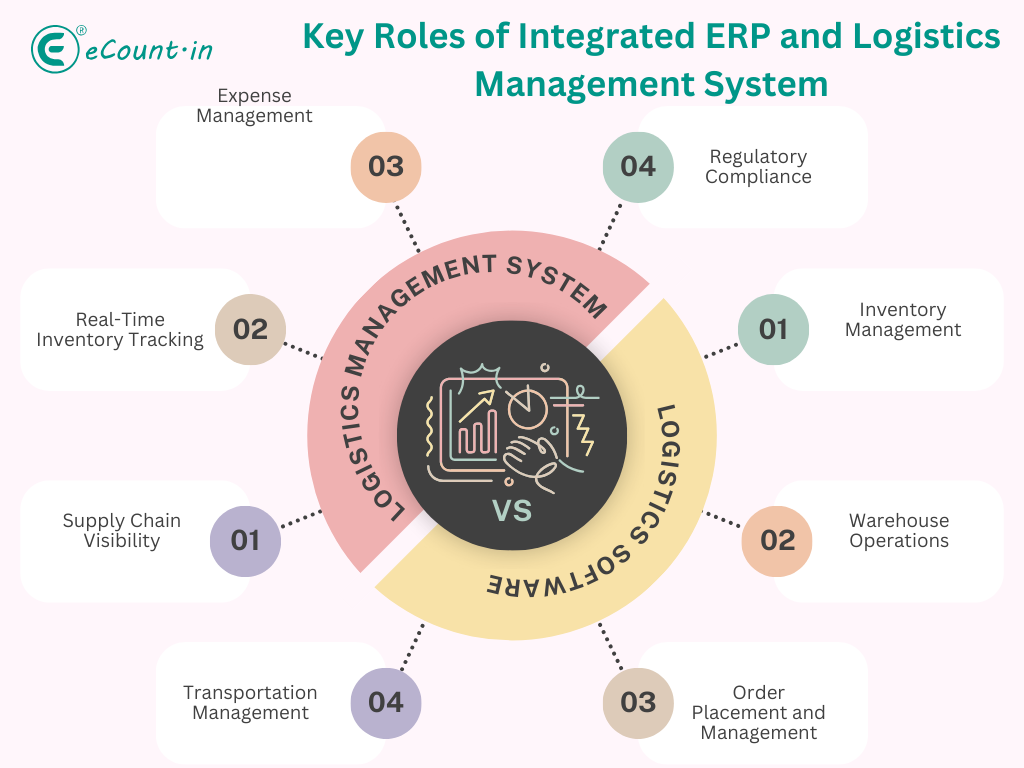Effective Logistics Management With ERP Systems
24-10-2024

In logistics management, businesses are associated with transporting various types of products from origin to the customer’s location. It is a part of supply chain management established many decades ago. Simply, logistics management involves controlling the transportation, warehousing, inventories, and distribution to ensure the goods reach their destination seamlessly and on time.
However, as a logistics business expands, challenges also grow and over time it becomes nearly impossible to manage all the operations without taking any help. This is where the integrated approach of logistics management systems and ERP systems come into the picture, helping you out with issues such as increasing expenses, imprecise demand fulfillment, and delays in deliveries.
The ERP (Enterprise Resource Planning) systems are the software solutions, crafted to automate multiple enterprise operations and integrate many as well. After implementation, businesses can effectively streamline operations (in this case, logistics operations) while maximizing the utilization of resources.
If you are running an SME, you could use the logistics software for small business and integrate it with the ERP systems to better manage your business operations. This blog post digs deeper into the importance of ERP systems in logistics management.
Key Roles of Integrated ERP and Logistics Management System
The importance of integration of ERP solutions with the Logistics management system can help the logistics business in various ways. Some major benefits are listed below:
1. Supply Chain Visibility
With the integration of ERP and logistics management solutions, managers can now have an eye on each operation that takes place under the organization and accurately synchronize data from different departments such as inventory, warehouse, and shipping management. This approach maintains transparency in between departments, improving operational consistency and productivity as well.
2. Real-Time Inventory Tracking
For logistics businesses, it is of topmost priority to maintain the precise amount of inventory stored. If not, it could lead to excessive storage or shortage, both cases are not good for the business. The integration allows logistics managers to manage the logistics inventory effectively and efficiently. They can keep real-time tracking of inventory levels, current and future orders, and consignment deliveries with a more precise approach. It helps make necessary improvements immediately whenever it is required.
3. Expense Management
When ERP gets integrated with logistics software, it becomes easier to automate various transportation-related operations, which reduces unnecessary human intervention. Ultimately, there will be fewer human errors involved so unnecessary costs will be eliminated. No business would want to spend more on resources and operations. So, this integration becomes critical for logistics businesses.
4. Regulatory Compliance
The enterprise resource planning software system ensures effective information consolidation in a unified system. This makes it easier to manage all the necessary documents and make sure that every department adheres to all the required regulations. The integration with the logistics system further streamlines operations by ensuring that the local and international rules and regulations are being followed throughout the transportation.
4 Crucial ERP Modules for Logistics Software
The integration of ERP with the logistics software helps businesses streamline and enhance the consignment transport operations across the supply chain. Let us discuss four critical ERP modules for logistics solutions.
1. Inventory Management
When you need to monitor and manage inventory levels in (real-time) across different locations, this particular module could be of great help. When you have precise information regarding inventories and demand, it becomes easier to store only the necessary amount, minimizing shortage and excessive inventory situations.
2. Warehouse Operations
Whether it is materials/goods receiving, choosing, packaging, and transporting, everything that comes under warehouse management can be done smoothly, ensuring that the operations are continual and efficient. Also, the storage space will be utilized more efficiently, reducing overall time consumption.
3. Order Placement and Management
Whenever there is a situation of multiple orders coming at the same time (which is quite often in medium to large-scale logistics business), the order management module of the solution can help by automating redundant processes. This will not only save time but also minimize mistakes.
4. Transportation Management
The powerful transport management function guarantees that the transportation routes are properly efficient. Managers may also optimize delivery scheduling and track goods throughout the process, even when they cross borders. This will ultimately cut gasoline and other associated costs while assuring on-time delivery.
In the competitive supply chain market, only surviving is not an option for businesses, you must know how to take your business to the next level to be profitable and succeed. In this journey, you can leverage eCount’s robust logistics management solution that not only helps streamline your business operations but also aids in achieving long-term business objectives while ensuring customer satisfaction.